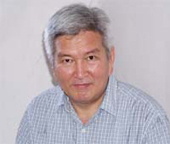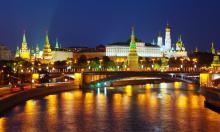Enraged protesters overthrow Kyrgyzstan's government and make president flee
Popular opposition leader Felix Kulov will most likely become the new president of Kyrgyzstan
Kyrgyzstan has set a new record in changing the power. Observers predicted about two weeks ago that there would be no revolution in the Asian republic of the former Soviet Union. Spin doctors and analysts agreed in their views that the uprising in the country's southern region would not lead to any fundamental changes. Kyrgyz President Askar Akayev was certain two days ago that he would not allow the violent change of the power to occur. The president was wrong. As a result, Akayev asked either for a political shelter on the Russian army base in Kanta, or simply escaped from his own state. For the time being, there is no precise information about Askar Akayev's whereabouts. 
It is time to pay attention to the new candidate for the presidential position in the small state of Kyrgyzstan. The absence of the prominent opposition leader has become the peculiar feature of the local revolution. The central figure of Georgian and Ukrainian revolutions was clear from their very beginning, although it can not be said about Kyrgyzstan. A popular opposition leader, Felix Kulov (born in 1948), who has been recently released from prison, has many chances to become the new head of Kyrgyzstan (Kulov was sentenced to seven years in jail in 2001 for power abuse on the position of the National Security Minister).
Mr. Kulov is quite a well-known figure in Kyrgyzstan. The Kyrgyz opposition believes that Felix Kulov was convicted for making real competition for the now-fugitive President Askar Akayev. However, as it usually happens in the history of post-Soviet states, Kulov and Akayev were originally colleagues and friends in politics. Felix Kulov was one of the few politicians, who expressed their protest against the coup in the Soviet Union in August of 1991 (Kulov used to be the head of the Kyrgyz Internal Affairs Ministry at that time).
Kulov set out his protest at a session with Askar Akayev. The minister's career started developing very fast after that. He was taking key positions in the republic – from the vice president to a regional governor, the national security minister, and the mayor of Bishkek, the Kyrgyz capital. Felix Kulov progressed from a colonel to a general. He was a tenacious and stubborn person, which probably made his political career decline during Akayev's stay at power. When Kulov was taking the post of the national security minister, he repeatedly accused members of the presidential family of their implication in criminal financial activities. The politician became Bishkek's mayor, although the sliding career did not make him change his opinions. In 1999, Felix Kulov established his party, Ar-Namys (Dignity), which started gaining popularity in the republic rather fast. Kulov left his position of the mayor over different views with the Kyrgyz administration. Mr. Kulov was probably aware of the fact that he would be able to accomplish a lot more as the central oppositionist and a fighter with the corrupted regime.
The Ar-Namys movement was formed not because of political or economic discrepancies with Akayev's regime – it was a protest against Askar Akayev's clan. The movement does not have a precise ideology. Kulov's organization stands up for everything positive, if one may say so. Ar-Namys's members want people to have a higher living standard, they strive for more democracy in the republic and they want officials to stop stealing. One cannot refer to the party as a nationalistic organization. Until recently, the party's leader, Felix Kulov, could not speak the Kyrgyz language, which also became a reason to withdraw his candidacy from the presidential election in 2000.
Felix Kulov has best chances to become the new president of Kyrgyzstan now. The politician has earned the reputation of the nation's defender: he struggled against corruption and suffered from the previous regime. The Kyrgyz politician will most likely have no problems in his relations with the Western society, which already considers him a political prisoner of Kyrgyzstan. One shouldn't hurry things up, though: there will probably be someone else in the opposition to challenge Kulov.
Subscribe to Pravda.Ru Telegram channel, Facebook, RSS!





